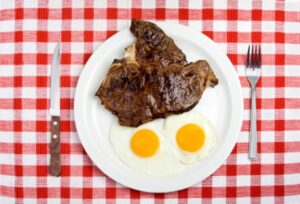Best Diets at 40 for Optimal Health at 70
As you approach your 40s, maintaining a healthy diet becomes increasingly important. Not only does it help manage your current energy levels and fitness, but it also sets the stage for a healthier you as you age. By the time you’re 70, you’ll want to be in the best shape possible, and your diet can significantly contribute to this goal. In this article, we’ll delve into the best diets you can follow at 40 to ensure optimal health at 70.
Nutrient-Rich Foods: The Foundation for Longevity
To sustain a healthy body as you age, incorporating nutrient-dense foods is crucial. These foods should be rich in vitamins, minerals, fiber, and antioxidants.
Fruits and Vegetables
Fruits and vegetables are packed with vital nutrients that can ward off diseases and keep you feeling energized. Aim to fill at least half your plate with these colorful foods.
Key tips:
- Eat a variety of colors to maximize your intake of different nutrients.
- Incorporate leafy greens like spinach and kale, which are high in vitamins A, C, and K.
- Berries are excellent choices due to their high antioxidant content.
Whole Grains
Whole grains are an excellent source of complex carbohydrates and fiber, which are essential for digestive health and sustained energy levels.
Key tips:
- Opt for brown rice, quinoa, barley, and oatmeal over refined grains like white rice or bread.
- Introduce whole grain versions of your favorite foods, like whole grain pasta or whole wheat tortillas.
Lean Proteins
Protein is vital for muscle maintenance and repair, especially as muscle mass naturally begins to decline with age.
Key tips:
- Incorporate lean proteins like chicken, turkey, fish, and legumes.
- Plant-based proteins such as tofu, lentils, and chickpeas are also excellent choices.
Special Diets for Aging Gracefully
Certain dietary patterns are particularly effective in promoting long-term health. Below are some of the most recommended diets for those who are looking into future-proofing their health.
Mediterranean Diet
The Mediterranean diet is renowned for its heart-healthy benefits. It emphasizes whole foods and includes healthy fats from sources like olive oil and nuts.
Key components:
- Fresh fruits and vegetables
- Whole grains
- Legumes and nuts
- Oily fish like salmon and mackerel
- Moderate consumption of red wine (if you’re drinking alcohol)
DASH Diet
The Dietary Approaches to Stop Hypertension (DASH) diet is designed to combat high blood pressure but is also beneficial for overall health. It is rich in fruits, vegetables, and lean proteins while minimizing salt and unhealthy fats.
Key components:
- Low sodium intake
- Emphasis on fruits and vegetables
- Whole grains
- Low-fat dairy products
Plant-Based Diet
Although it may not be for everyone, a plant-based diet has been associated with numerous health benefits. Reducing animal products can decrease the risk of chronic diseases and promote overall wellness.
Key components:
- Fruits and vegetables
- Whole grains
- Legumes, nuts, and seeds
- Minimization of animal products
Hydration: The Unsung Hero of Aging Well
Staying hydrated is often an overlooked aspect of maintaining good health as you age. Your body’s need for water doesn’t diminish with time, and staying hydrated can aid in digestion, circulation, and even brain function.
Key tips:
- Drink at least eight glasses of water a day.
- Avoid excessive amounts of caffeinated and sugary drinks that can dehydrate you.
- Incorporate water-rich foods like cucumbers, watermelon, and oranges into your diet.
Supplements: To Take or Not to Take?
While it’s best to get most of your nutrients from food, there are circumstances where supplements can be beneficial, especially as you age.
Key supplements to consider:
- Vitamin D: Essential for bone health, especially if you have limited sun exposure.
- Calcium: Important for maintaining bone density.
- Omega-3 fatty acids: For heart and brain health.
- Probiotics: To support gut health.
Note: Always consult with a healthcare provider before starting any new supplements to ensure they’re appropriate for you.
Setting the Stage for a Healthy Future
Adopting a nutrient-rich, balanced diet at 40 is one of the best investments you can make for your future self. By following the guidelines above, incorporating special diets like the Mediterranean or DASH diet, and staying hydrated, you’ll be setting the groundwork for a healthier and more vibrant life at 70. Remember, it’s never too late to start making healthier choices, and your future self will thank you for the effort you put in today.









